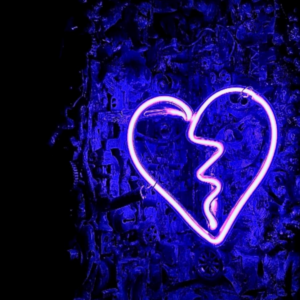(red)
On the outskirts of the city lies a sleepy town I’ve given everything to: first breaths, first birthdays, first broken bones. I can’t see everything from my bedroom window. Not the pair of tracks that snake through town like the skeletal remains of a serpent and its former lover, always running in perfect parallel, forever in sync. Not the railroad crossing, it’s blinking warning lights, the candy-cane-striped boom gates. Even so, I know they’re close by. I can hear the telltale whistle as the cargo locomotive pulls through shortly after midnight, like clockwork: low and mournful, the opening notes of a funeral dirge composed to mark the passing of the previous day. With each drawn-out tone, blurry pops of color in warm hues pulse in my field of vision.
Waaahhh.
Waaaahhhh.
Waaaaahhhhhhh.
I part the curtains in front of my window when the sound passes and the boy across the street does the same. Flashes his bedroom lights. One. Two. Three times. I answer back with the same signal. One, two, three. Goodnight. I lie in bed to wait for the light of morning.
My lids are finally starting to grow heavy when headlights sweep across my bedroom wall through the crack between the curtains, and I hear the soft crunch of tires rolling over stray pebbles and debris by the side of the road before coming to a stop. Bright vermilion dots burst all around me. Even in a half-dream state, I know what that sound means. Dear brother is home at last.
I look back at the window across the way, searching for evidence of movement, but I don’t find it. Eli’s never had trouble sleeping, not even during the torrential downpour that accompanies a category four hurricane making landfall down south, transformers blowing in the distance.
A car door slams below, and with it, a dull burgundy flashes before my eyes. Harper walks up to the front door with his keys in one hand, a girl in the other. I haven’t seen this one before, but she resembles all the others: long, dirty blond hair; denim cut-offs paired with bedazzled flip-flops that probably cost more than they’re worth; bright red lipstick that looks like it hasn’t been reapplied in hours.
I don’t confront him anymore. There was a time when I tried. That first time he came home drunk, I was thirteen and he was fifteen. I was sitting in my bedroom waiting up for him, worried about him because our parents never worried enough. We met each other halfway, at the foot of the stairs. The details are hazy, waxy crayon scribbles in my memory. I remember wanting to hit him, to hurt him, to hold him—but seconds later, I was lying there in the foyer with a hand over my stinging cheek, staring at the stranger above me in shock.
Now I hear two sets of footfalls on the carpeted stairway. The female giggle—a wisp of soft coral. Beer bottles clinking—a glittering ruby. A door on the other end of the hallway shutting.
I hear familiar noises all night long: the drunken laughter and the muffled moans, rhythmic breathing so loud that for a moment I think he’s in the room with me, not behind the door of a room down the hallway. I think about all the girls on the dance team who are in love with him, who make fools of themselves whenever he walks within a twenty-foot radius. Maybe some of them have even been with him before, another faceless waif outside my window.
They’ve always called me lucky for being Harper’s sister, for living under the same roof as him, but I’m starting to think lucky isn’t the right word for it.
(orange)
A year passes. My spring recital ends with the annual gala. We drink Martinelli’s and dance stupid under a glittering disco ball. The graduating seniors receive medals and flowers. Hugs. Tears. We talk about our memories of long hours spent at the studio, of playing out fantasies on a stage. We don’t talk about real life. We don’t talk about the heavy objects that are balanced on rafter beams, poised to break us open at the slightest quake.
Harper, Eli, and I leave together that night. The three of us, like it’s always been, heading out the performance hall’s revolving doors and into the parking lot. The night sky is overcast, a light drizzle already escaping from the low-hanging clouds.
“What are you going to do with that thing now that the dance is over?” Harper nods in the direction of my neckwear, the lynchpin that holds my costume together. I’d changed into a different dress for the party, but the long, multi-colored scarf remains around my neck.
“I’m going to accessorize all my daily outfits with it. Obviously. I mean, look at this versatile piece of fabric. It’s a scarf. No, it’s a turban. But now it’s a tube top. Oops, it’s actually a belt. Maybe even a wrap skirt.” I cycle through all my best fashion magazine poses as rapidly as I can muster in the middle of the road. “This would be the star piece in any capsule wardrobe, wouldn’t it? Scarves are the new LBDs.” I’m only half-joking. Right now, I never want to take the thing off.
While I’m giving this private curtain call performance, I feel a part of myself pull away from my body. It floats there next to me, observing us all from a distance. That part of me whispers in my ear to enjoy this moment, that it’ll be my last happy memory of our trio. I don’t know what it means, that nagging feeling. It lingers even as I try to fling it away with a flick of my hand.
Harper tugs lightly at one of the ends of the scarf, gives me the once-over, and without a sound from anyone, all of me comes back down to Earth. “You’re a safety hazard in that thing.” My brother laughs, but the sound feels empty. Ever since he left home for college his entire being has felt a little hollow, like he’s missing some essential lever or screw inside, some mechanical part that made his body run. Like if I shouted into his open mouth, all I would hear in return is my own echo.
“Hey! We should stop by the zoo on the way home.” Eli’s voice breaks through the barrier of my thoughts. I’d almost forgotten he was there, all the bubbly in my stomach starting to make me feel lightheaded and queasy. “Consider it a donation for their giraffe exhibit. Those creatures weren’t built for the cold. They must freeze their asses off every winter.”
I turn around to look at him. “Well, in case you didn’t notice, it’s almost summer. Besides, the zoo is closed. It’s almost midnight.”
“So? When has that ever stopped anyone?” He stares back at me, and I feel an accusation brewing behind those dark eyes. “We break in, jump the fence, scale the brick wall. We’ve all seen the movies. It can’t be that hard, can it?”
“My, my, my, what have we here? Elliot Cameron Wells, glamorizing breaking and entering?” Harper lets out a low whistle. “What would the admissions committee at Stanford say?”
“Who says they have to find out?” Eli’s face is turning that strange shade of pink it always does whenever Harper teases.
“Seriously? How many mile-long, watercolor scarves exist around here, do you think?” Harper ruffles Eli’s hair as if he were a clueless younger brother.
Eli rolls his eyes but breaks into a run when Harper’s green Jeep finally comes into view. “Shotgun!”
“What, you mean you’d rather sit up front with Harp than sit in the back with me?” I pretend to be hurt as I sprint to catch up with him, sidestepping the puddle of water that’s collecting near the curb. A thin layer of oil is already forming, creating a marble swirl of color at its surface.
Eli just grins. “Laney, you don’t honestly expect me to give up the front seat just to sit with you, do you? Can’t control the music from the back of the car, you know.”
I shove him out of the way, playfully. He stumbles. I shove Harper too, for good measure. He stands his ground, rock solid. I push him again; he doesn’t budge. We stay like that for what seemed like a long time: my fingertips on his shoulder, his whole body unresponsive. “You know what, I’m calling shotgun. This is my night, and I won’t have it ruined by your terrible taste in music.”
“Hey, I had dibs first!” Eli pushes to get to the door ahead of me.
“Guys, guys, guys, I have a novel idea. Why don’t you,” Harper points at me, “sit in the back with your boyfriend, and you,” he nods his head at Eli, “sit in back with your girlfriend? I know how absolutely heartbroken you’ll both feel to be ripped apart from me for even one second, but rest assured that I’m still in the car with you, we are never apart for long—”
“Shut up.” I retreat and crawl into the backseat, leaving ample space for Eli to climb in after me, but he ignores Harper’s monologue and sits down in front anyway without looking at me. Harper grins at me via the rearview mirror. I stick my tongue out at him.
“Let’s go home.” As always, Harper has the final word.
I try to look out the window at the world outside as he pulls out of the parking lot but it’s so dark outside that my reflection keeps getting in the way. Moments like this, I feel normal again, but that feeling never lasts. I slide my hand along the surface of the car seat below me, as if I can somehow leave the memory of this night trapped inside the car for a little while longer.
But then our comfortable silence is interrupted by Harper’s voice: “Just one more thing: What the fuck is an LBD?”
I laugh. We all do.
Before long, the rain is beating against the car and running down the windows, warping my view. Dark shades flit before my eyes: a burnt orange here, an ochre there. Bronze everywhere.
I watch the fuzzy dice swing back and forth from the rearview mirror, as the rain pounds loudly on the roof of the car, and the windshield wipers chase each other from left to right, right to left, then doing it all over again, never tiring. They add their own beat to this lullaby, and the repetitive sounds pulse around me in a dim amber glow.
I doze off at some point. Because someone—Harper? Eli? I can’t place the voice, the registers and cadences all start sounding the same—yells, “Watch out!” and then that terrifying wall of rusted metal seems to come out of nowhere, revealing itself in the darkness. When we take the hit, the noise is deafening. Our world spinning.
Glass flies everywhere, into my hair and into my skin, a whole chunk of shattered window in the backseat next to me. Wet hair is plastered to my cheek. The air feels heavy around me. I hear muffled voices, dogs barking in the distance, an uneasy stillness. The stench of smoke overwhelms me as orange flames dance in front of my eyes. For a second I swear I even see the stripes of a tiger circle around me, like an animal stalking its prey.
(yellow)
I have a dream. In my dream, I’m lying in a hospital bed hooked up to machines and no one knows how this story ends. If I live or if I die.
A door creaks open. At least, I think I recognize that sound—bright like a bumblebee.
In the darkness of my mind, I imagine a sliver of golden light breaking through between the doorframe and its door, crawling across the floor and warping, bending, growing larger like a monster emerging from underneath my bed. In my room at home, back when I was a little kid, I’d keep my eyes shut each time I heard the telltale noise after midnight, and pretend I was asleep. Harper would walk in, shut the door quietly behind him, then sit on the edge of my bed and nudge my shoulder. “Hey Laney, you asleep?” I wasn’t. He knew I never was. I’d open one eye a crack. We both stifled our laughter, whispered our secrets, even though we never had to worry about anyone hearing us.
Eli still lived in Utah in those days, an only child alone in his bedroom full of expectations for future greatness, while Harper read me picture books by flashlight beam. Our parents were always too tired in the evenings for bedtime stories. They’d drink a mug of warm jujube tea, apply Tiger Balm to their upper lips, and pass out before the hour hand struck nine. Harper didn’t want my childhood to be lonely like his. So he tucked me in, read me stories about anthropomorphic trains with resilient spirits, who chugged their way up very steep hills: “I think I can, I think I can.”
In English, our surname translates to leaf, but the Chinese character for it also happens to be a homophone for night. Harper used to tell me that was why our parents had green thumbs and thrived in the sunlight like plants, but he and I? We were night people.
“Laney. Laney, can you hear me?”
It’s that voice again. I know that voice.
(green)
My dance studio has always been my home away from home, a cavern of rooms on the second floor of a nondescript shopping center in the heart of Chinatown. The rooms sit directly on top of a Chinese bakery on the ground floor, and the large glass window in the ballet room overlooks the parking lot.
The January before the accident, my dance teacher Shelby decides she wants to stage my spring solo behind a prop window. She pitches it to me like this: I’m a girl trapped inside a haunted house, except I don’t know it’s haunted—I don’t even realize I’m trapped. The crowd of onlookers on the other side can see me. But no matter what they do or say, I never seem aware of their presence. My costume will be a short black dress paired with the longest, most delicate scarf I’ve ever worn, ever laid eyes on. The sheer fabric has been dip-dyed every color of the rainbow, each new stain of color representing a memory I try to leave behind on stage, but to no avail: Throughout the dance I continue to carry it around with me, whether it’s looped around my neck or tied in my hair or wrapped around my waist.
Shelby pulls the accessory out of the costume closet that first day and lets me try it on. “I found it at that flea market off 59 last month. I think it was homemade. You can see some of the imperfections in the stitches here. I don’t know how or why it got sold. But right away, I thought of you and that incredible brain of yours. All the invisible things it allows you to see.”
Shelby teaches me the choreography for the dance in pieces. We make it up together as we go along, using the real scarf in practice every time. Whenever I look at myself in the mirror with it on, I recognize something I’d thought was lost.
After rehearsal ends that first day, I throw a sweater dress on over my dance clothes and head downstairs. Harper is in the bakery, buying both of us fresh pastries. “I got you pineapple cake,” he says, handing me two golden-brown squares sealed in individual paper pouches. “The good kind, not that weak pre-packaged shit they sell at the store.”
“Thanks.” I tear the wrapper and bite into one of the sweet treats, careful not to let a single crumb fall to the floor. The buttery outer shell is baked to perfection. The pineapple jam inside tastes like a holiday morning.
“So y’all were pretty quiet this afternoon.”
I nod in agreement, my mouth full.
Once he drops me off at the shopping center, Harper often sits at one of the small round tables in the corner of the shop and reads or composes music while I’m in class. He says he can visualize our dances just by listening to the sound of our feet on the ceiling above him. That afternoon, he taps out a rhythm on the glass counter above a row of mouthwatering stuffed buns, nailing the exact time signature of song I’m dancing to. His index and middle fingers become a pair of legs as they travel across the surface, and I see splashes of seafoam in place of each step. Mentally, I review the new choreography we’ve been rehearsing, move by move.
I nod again. He’s always right. “Shelby’s getting me started on a solo for the end-of-year showcase.” I usually give Harper all the details to every new routine right away, but this time I bite my lip. Does he really have to know everything? I want this dance to belong to only me a little longer.
Harper doesn’t say any more, but I feel the energy in the room change immediately. I’ve disappointed him. As we walk out to the parking lot, I look back up at the window of the ballet room. I can see the overhead lights of the dance studio and the faint shadows of some of the younger dancers stretching in distorted shapes towards the walls and ceiling. Their malleable forms remind me of the me I once was. I don’t yet realize why that recognition fills me with such sadness.
(blue)
When Harper and I were kids, I lived for the rare day trips our family would take downtown, when the skies were cerulean and clear, to visit the zoo. Not because I enjoyed gawking at caged animals in their unnatural habitats, but because I loved riding the open-air trains—their metal bodies painted red and gold—that circled the perimeter of Hermann Park nearby. Where we grew up, we didn’t have an Amtrak line that could carry us with speed and ease across state lines. We only knew cargo trains and container parks. The low whistle of something passing through our little town on its way to somewhere else.
Harper didn’t share my enthusiasm for transportation hubs. Instead, he took a special interest in endangered species. As soon as our tickets were paid, he made a beeline for the wild cat exhibit. He could spend all afternoon in just that one section of the zoo. The cheetahs, snow leopards, and African lions took a special interest in him as well. When he locked eyes with them, the rest of the world seemed to disappear as feline and human engaged in an intense staring contest that somehow felt profound—it was like he spoke their silent, wordless language. His body language changed when he was in their vicinity. Even the way he moved altered. The two species matched each other, roar for cobalt roar. I was endlessly fascinated by this display, but at the same time I felt a pang somewhere inside myself that I couldn’t label or place. I didn’t realize it then, but I was jealous.
(indigo)
The music is what wakes me up that Sunday morning, four years before the end. I pull back the curtains to see a boy about my age sitting out on the lawn directly across the street, strumming a guitar that lights up my brain in a spectrum of cool-toned colors and belting out lyrics to an Indigo Girls song.
It’s August. A sheen of perspiration forms on my skin the moment I walk outside. The new boy squints up at me as I approach him, everything around us dead still. “Indigo Girls, right?” I call out.
He nods, stops playing, puts down his guitar. I’m standing right in front of him then, blocking the sunlight from his eyes and casting a shadow over him. “You a fan?”
“No, colors fascinate me, that’s all. I was born with this weird neurological condition. My senses get mixed up in my brain, like wires getting crossed. It’s why I see colors whenever I hear music.” I want to tell him he has a voice the color of mixed berry Kool-Aid, but I’ll probably scare him off if I lead with that. I plop down next to him in my light-wash denim shorts, grass stains be damned. “I’m Laney, by the way. Laney Yeh.” I turn to face him, hold out my left fist for him to bump.
“Eli,” he replies, sounding like he’s somewhere else. His knuckles barely graze mine.
“So which side are you coming from, Eli?”
“Huh?”
“The coasts. You from the east or the west?”
“Oh.” He seems relieved that’s all I’m asking. “Neither. It’s—uh, we’re from Utah.”
I know nothing about the Rockies. Geography has never been my strong suit. “Is that where they grow all the potatoes? I love potatoes.” In fifth grade, I started a potato club. We only managed six members, the bare minimum for a school organization, but we enjoyed passing around a bag of greasy chips while discussing the nutritional value of our favorite vegetable. We even made a PowerPoint presentation that convinced the cafeteria staff to serve either loaded potato skins, hash browns, or chuckwagon fries at least three times a week.
Eli is giving me a weird look, like he can’t decide whether I’m joking or just a little slow. “Ah, no. You’re thinking of Idaho. Utah is all ski slopes, Sundance, and Mormons.”
“Oh, too bad.” I realize too late that I’ve just insulted winter athletes, filmmakers, and Latter-Day Saints (whatever those are) everywhere, so I quickly change the subject. “So, Eli. What’s your deal? Are you one of those people who’s super talented at like, three million things?”
Eli stiffens. “What makes you say that?”
“I heard your mom yesterday, bragging to my mom about your straight A’s…and your impeccable manners…and your golden arm…and then I wake up to…well, this.” I gesture towards the guitar, eyebrows raised. “I mean, I have to assume when she said golden arm she just meant you throw like, an ungodly fastball or something. Your arm looks like it’s made of regular old flesh to me. The same skin and bones as the rest of us mere mortals…”
“Don’t listen to my mom. And no, I play football. So I’m not some ace pitcher. I’m just a…quarterback.” He sounds almost embarrassed by it.
“Well, you’ll fit right in around here what with the pep rallies and homecoming mums and…whatever.” The truth is, even though I already plan on trying out for the high school dance team in two years, I’ve never cared for football games, pleated skirts, or pompoms. “But about the music, uh, why—?”
“My uncle taught me when I was a little kid,” Eli says. “It’s not a big deal. You got a brother who plays, right?”
“Yeah.” I glance across the street at Harper’s window, temporarily bewildered by how different it looks from this angle. “He sleeps like a corpse so I’m sure you didn’t wake him. You’d probably rather be talking to him than me, huh?”
“No offense.”
My mind is wandering the way it always does when I feel content. I only just met the boy but something about his arrival in our lives feels right. I can already see Harper and Eli out here every evening after dinner, after the sun has set and the air has cooled, the two of them creating a rainbow of music together and singing at the top of their lungs with me next to them, dancing barefoot next to the flowerbed. The three of us could be beautiful together.
“Listen, I gotta bounce.” Eli’s voice interrupts my fantasy, flooding my mind with a sea of periwinkle. “Church and all that.”
“Right. All that,” I echo, remaining on the grass.
He starts walking away behind me, back into his family’s new house.
“Eli?”
“Yeah?”
I’m still not facing him. “I’m sorry.”
“For what?”
“All sorts of things…things that haven’t happened yet.” I finally turn my head then, making eye contact: the Laney from the future reaching him, apologizing for the next four years, apologizing for how they will end before we know it, apologizing for the long life he will now never have.
He nods, looking confused, and we go our separate ways for the time being. I’m back inside before I realize I should’ve at least said “Welcome.” Welcome to Texas. Welcome to the neighborhood. Welcome to our lives.
Welcome home.
(violet)
That pivotal night sneaks up on me like a bandit in a black ski mask, and I’m not at all prepared for what it tries to take from me. I perform my window solo to a haunting instrumental by the electropop group Glass Candy. Shelby and I cut the music together, recreated the track so the whole thing loops three times, like I’m stuck in an endless cycle I can’t break out of. Each time the music starts over, I do the same movements again, but with subtle differences in interpretation.
When the last note finishes up, the whole theater is silent. I let out the breath I’ve been holding and realize I’m exhausted, both in the dance and in real life. I pick up the scarf that I’d thrown to the floor as the music finished. I glance out the faux window at the foot of the stage, notice for the first time the people on the other side. Suddenly, they’re all clapping. The applause starts out a milky lavender before it overlaps on itself, blooming into a brighter lilac. Until finally, the noise is almost deafening—a cloud of deep and dark aubergine.
Eli is leaving for college at the end of this summer. Stanford. I don’t know what the plan is. Will we try long distance? Are we breaking up? We’ve been avoiding the subject. We haven’t discussed it at all.
It’s the week before exams at Trinity so Harper also drove down to see the show. At the reception gala, the three of us stick together like a trio of insects on a strip of flypaper. My mom and dad slipped out early. Parties aren’t really their scene, but they were in the audience for the performance. At least, I think I saw them. I don’t really care. I’m hungry and the platter of egg tarts at the end of the table is calling my name. I help myself to two or three. Even wash them down with a sip from Harper’s flask when no one’s looking. It’s the one I got him for his last birthday, the one with music notes engraved into the aluminum. Whatever’s in there burns my throat on the way down but I decide I like how it feels.
On our way out, we joke about giraffes and other animals raised in captivity, about the versatility of our clothing. None of it is really funny, but I’m afraid if I don’t laugh I’ll start to cry.
It doesn’t start raining, really raining, till we’re safe inside Harper’s car, the soft top up.
The sky is an angry purple when we head back home. The roads are wet, slick with oil. I keep nodding off but jerk awake every time we stop abruptly at a red light. At one point, Harper and Eli are arguing over which CD they should put on next. Harper wins, but once the disc is in the player and music overtakes the car, they just find something else to argue about. They always do.
“I don’t think we should go home yet,” Harper suddenly says.
“Oh, so now you want to swing by the zoo? Make up your mind, Yeh. And slow the fuck down, will you? You’re going like twenty over.”
Harper doesn’t seem to hear the last part. “I’m starving though. Aren’t y’all? We should stop by a drive-thru for crispy tacos. With extra packets of hot sauce, obviously.”
“Dude, we just ate at the thing. How can you be hungry again already?”
“Please, that was finger food. I want a meal.”
My cheek is pressed up against the window. I’m looking up at the sky, the clouds covering all those stars. When I look back towards the front of the car, I realize Eli isn’t watching the road either. His eyes are on Harper, a curious expression on his face. It’s one of wonder, of admiration, of a bittersweet sadness. It’s setting off all kinds of alarms in my head but I’ve already been ignoring them for years, and now I’m too tired to put out the fire.
“Watch out!” I recognize Harper’s voice now. It’s the one I grew up hearing next to my ear, no matter what the situation. It’s the one that speaks to me now while I lie here in the hospital. Always a little too close for comfort. That night, in the car, he slams the breaks, but it’s no use. We can only save ourselves. He ducks instinctively as the impact tears the roof off the car and sends us flying into oblivion. Eli and I don’t see what he sees until it’s too late: A cargo train is parked on the tracks, the dark container it transports shrouded in the night. No full moon to cast a spotlight on this outdoor stage. No velvety clouds to part like curtains. Just an endless, black night.
That’s when I hear that voice again: “Laney, open your eyes.”
Finally, I do. This time, the first thing I see isn’t a color.




